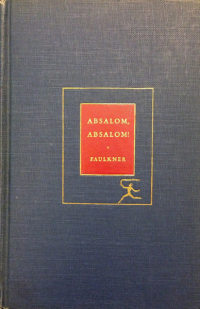
Absalom, Absalom! cover
Character: Charles Bon
Source Text: Faulkner, William. Absalom, Absalom! 1936. New York: Random House, 1951.
Entry Author: Claire McDonald
Charles Bon is the son of protagonist Thomas Sutpen and Sutpen’s first wife, Eulalia Bon Sutpen. During Sutpen’s time spent as a plantation overseer in Haiti, he was offered Eulalia’s hand in marriage after ending a slave rebellion on the plantation. Sutpen assumes that she is of Spanish descent, but she is actually part black, meaning that their son is also part black. Sutpen cannot bear the knowledge that his wife and son are partially black, and so he abandons them and attempts to begin a new life. Eventually, Eulalia and Bon leave Haiti and move to New Orleans.As a student at the University of Mississippi, Bon is admired and practically idolized by many of his classmates, including Sutpen’s recognized son, Henry Sutpen. Henry and Bon become friends at school, and Henry brings Bon to Sutpen’s Hundred for Christmas; at the time, Henry is unaware that Bon is his half-brother. Bon’s reunion with Sutpen poses a significant threat to Sutpen, as Bon is evidence of Sutpen’s past actions. However, he refuses to acknowledge him as his son until Bon and Judith, Sutpen’s daughter, express their desire to marry each other. Sutpen is furious about this, but his anger is more directed at Bon’s perceived blackness than at the fact that Judith and Bon are half-siblings.Just as Sutpen disowned Bon because of his blackness, Henry eventually does the same. Henry and Bon are close friends while they are attending University of Mississippi together, and Henry initially repudiates his father when he learns that Bon is his half-brother and that Sutpen had abandoned him and his mother. He continues to support Bon’s wish to marry Judith until Sutpen reveals that Bon is partially black. Henry, much like his father, is also disgusted and infuriated by the thought of Bon tainting their family’s pure bloodline. Bon’s death comes at the hands of Henry, who shoots him at the gate of Sutpen’s Hundred.
Bon’s race is important to Absalom, Absalom! because of his father and brother’s response to it. Despite the fact that both Bon and Henry are Sutpen’s biological sons, Sutpen rejects Bon because he cannot accept the fact that Bon is partially black. Bon’s status as black also means that Sutpen’s dream of becoming a Southern aristocrat cannot be achieved; Bon cannot inherit his father’s plantation because of it, meaning that Sutpen’s goal of creating a legacy cannot be achieved. Bon also signifies the desecration of the Sutpen bloodline’s purity, which Sutpen also cannot abide by. Faulkner is able to use Bon as a way to comment on Southern perceptions of race. Because Bon is considered to be black, he brings shame upon his own father because he is seen as subordinate; the bond between father and son is severed because Sutpen refuses to accept a son who is, by the one-drop rule, black.

